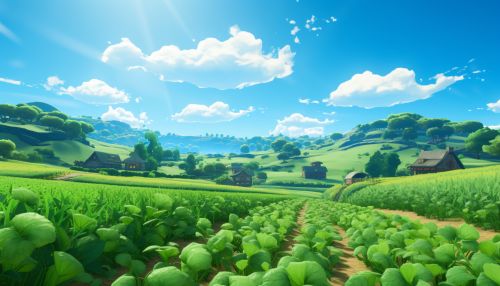Sustainable farming
Introduction
Sustainable farming, also known as sustainable agriculture, is a method of farming that focuses on producing food while maintaining an ecological balance. The goal is to have a food system that is sustainable and can last indefinitely. The concept is rooted in a long-term, holistic approach that considers environmental health, economic profitability, and social and economic equity.
Principles of Sustainable Farming
Sustainable farming operates on certain key principles that distinguish it from conventional farming practices. These principles aim to ensure the health and welfare of both the environment and the people involved in the farming process.
Stewardship of Natural Resources


Sustainable farming emphasizes the preservation and enhancement of the environment. It promotes the stewardship of both natural and human resources. Natural resources include water, soil, air, and wildlife, while human resources involve the people who work on the farms and the communities surrounding them.
Biodiversity
Biodiversity is a critical component of sustainable farming. It involves the cultivation of a variety of crops and livestock, rather than focusing on a single product. This diversity helps to create resilience against pests and diseases and reduces the need for chemical inputs.
Economic Resilience
Economic resilience is another key principle of sustainable farming. It involves creating farming systems that are resilient to changes in the market and climate. This can be achieved through diversification of crops and livestock, and by adding value to products through processing and direct marketing.
Social Equity
Sustainable farming also emphasizes social equity. It promotes fair treatment and good conditions for workers, as well as the engagement of local communities in decision-making processes.
Methods of Sustainable Farming
There are several methods and practices associated with sustainable farming. These methods aim to maintain soil health, conserve water, protect biodiversity, and reduce the use of synthetic fertilizers and pesticides.
Crop Rotation
Crop rotation is a method that involves growing different types of crops in the same area in sequential seasons. This practice helps to maintain soil fertility and reduce the build-up of pests and diseases.
Cover Crops
Cover crops are plants that are grown to cover the soil rather than for the purpose of being harvested. They help to improve soil health, reduce erosion, and manage pests and diseases.
Agroforestry
Agroforestry is a land use management system that combines trees and shrubs with crops and/or livestock. It offers a variety of benefits, including biodiversity conservation, carbon sequestration, and improved soil health.
Integrated Pest Management
Integrated pest management (IPM) is a strategy that uses a combination of techniques to control pests, including biological control, habitat manipulation, and modification of cultural practices.
Benefits of Sustainable Farming
Sustainable farming offers numerous benefits, both to the environment and to society.
Environmental Benefits
Sustainable farming practices help to maintain healthy ecosystems and wildlife populations. They also reduce the use of non-renewable resources and minimize the release of harmful pollutants into the environment.
Social and Economic Benefits
Sustainable farming can also provide social and economic benefits. It can help to create jobs, strengthen local economies, and improve the quality of life for farming communities.
Challenges of Sustainable Farming
Despite its many benefits, sustainable farming also faces several challenges. These include economic barriers, lack of knowledge and training, and policy and institutional barriers.
Conclusion
Sustainable farming is a critical approach to agriculture that seeks to balance the need for food production with the preservation of the ecological system within the environment. It offers numerous benefits, but also faces significant challenges. Continued research, education, and policy changes are needed to further promote the adoption of sustainable farming practices.
